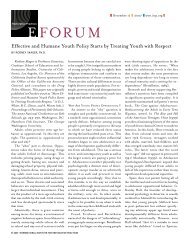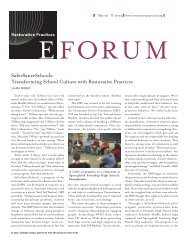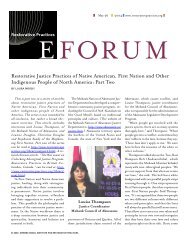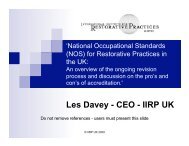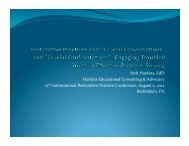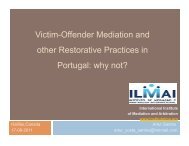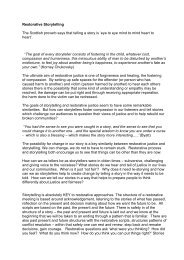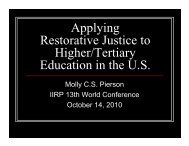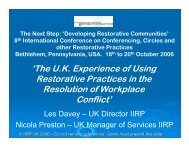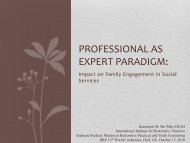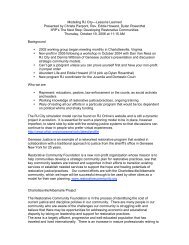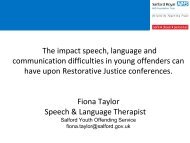Between Wholeness and Restoration - IIRP
Between Wholeness and Restoration - IIRP
Between Wholeness and Restoration - IIRP
Create successful ePaper yourself
Turn your PDF publications into a flip-book with our unique Google optimized e-Paper software.
greater recollection of what it was to be whole. As they simultaneously reach out for<br />
restoration, original individual wholeness <strong>and</strong> worth that has been broken is replaced by a<br />
wholeness that begins to grow because broken pieces choose to walk with each other for<br />
a time. This according to Palmer (1983) <strong>and</strong> hooks (2003) is education that practices<br />
love, education as a practice of freedom—“The goal of a knowledge arising from life is<br />
the reunification <strong>and</strong> reconstruction of broken selves <strong>and</strong> worlds. … In such knowing we<br />
know <strong>and</strong> are known as members of one community …” (p. 132).<br />
Conclusion<br />
Theory, according to Thomas (1997), is used to mean many different things in<br />
education <strong>and</strong> as a result causes confusion, discourages diversity of thought, <strong>and</strong> is<br />
overall of little use in moving educational underst<strong>and</strong>ing forward (p. 75, 84). Though I<br />
have encountered the oblique nature of theory in examining the theoretical foundations of<br />
restorative justice <strong>and</strong> restorative practice in this paper, in the end I would be hesitant to<br />
support his statements. Working to uncover the theories Zehr <strong>and</strong> Wachtel use <strong>and</strong> then<br />
trying to articulate my own underst<strong>and</strong>ing of why it is restorative practice <strong>and</strong> restorative<br />
justice are effective, requires that I question <strong>and</strong> critique the foundational elements found<br />
in each. Several benefits arise out of this. Had I not done this, I would be subject to<br />
taking things for granted that might be instrumental in the success or failure of restorative<br />
practice <strong>and</strong> restorative justice; I would not be able to see how our theories overlap <strong>and</strong><br />
support each other; <strong>and</strong> moving the theoretical underst<strong>and</strong>ing forward would be a much<br />
slower process. I would say that theory does not discourage a diversity of thought but<br />
rather serves as a place for examining diversity of thought <strong>and</strong> then becomes a



